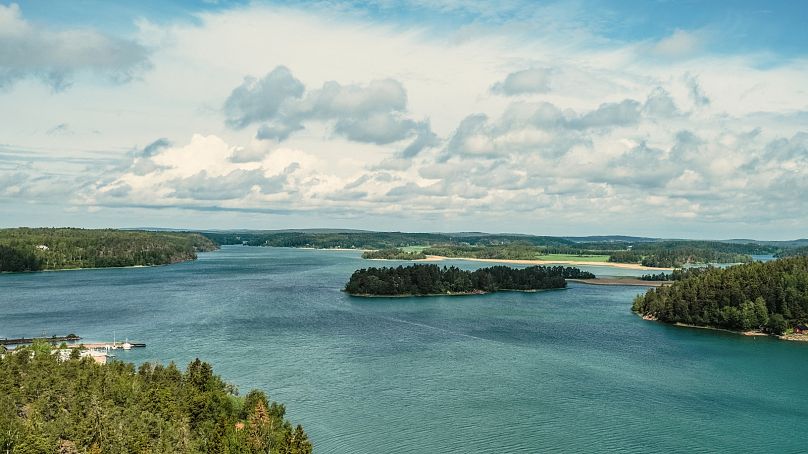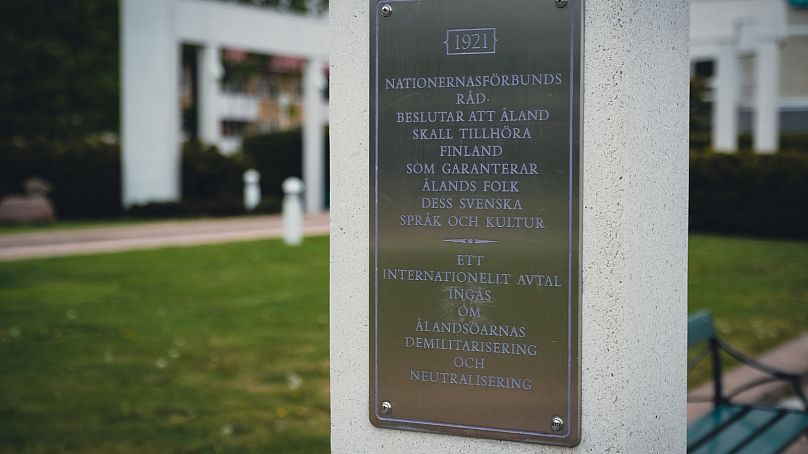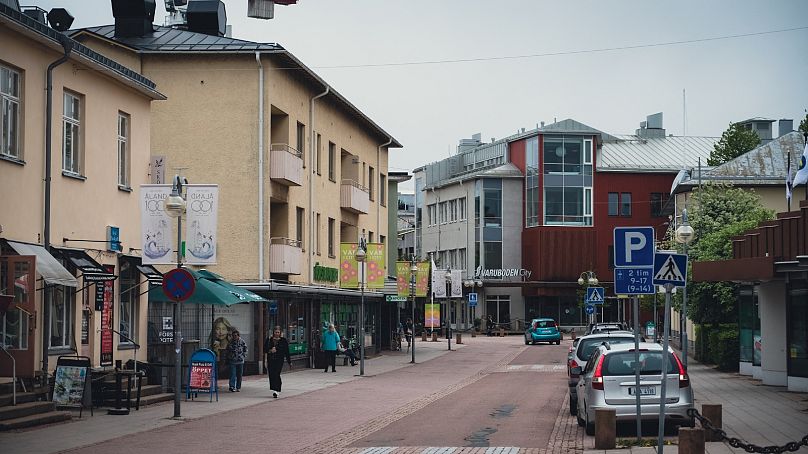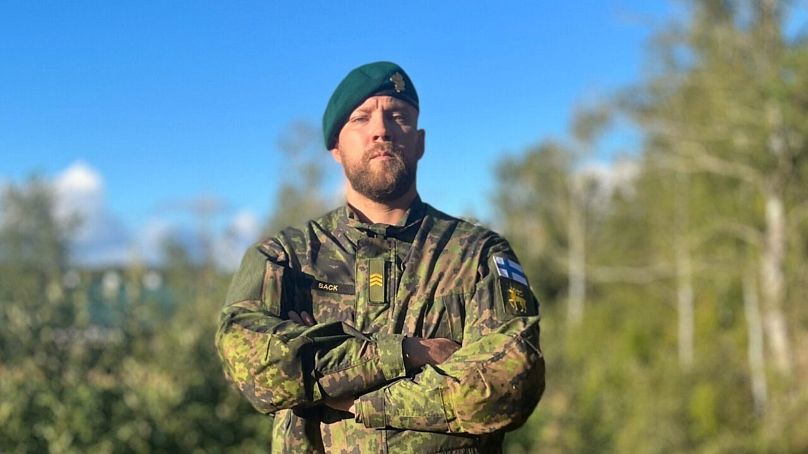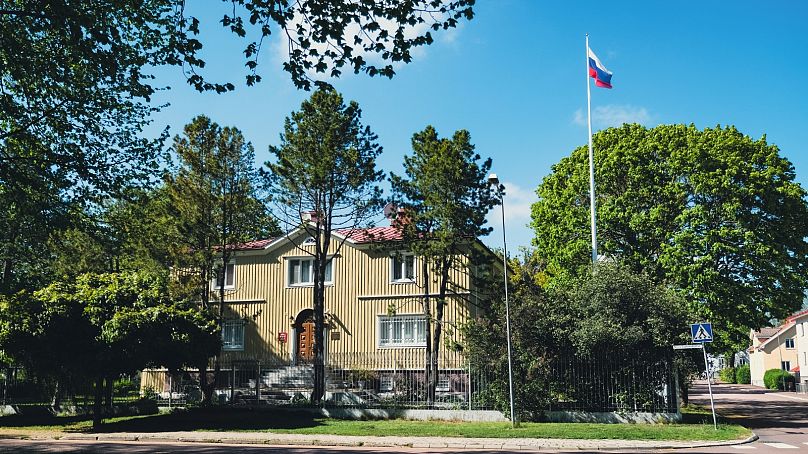Finland's incoming government faces calls from within its own ranks to remilitarise the Åland Islands in case of future Russian aggression.
They gather every day at 5pm outside the Russian consulate in Mariehamn.
A small group of protesters in the capital of the Åland Islands, making their opposition to the Kremlin's invasion of Ukraine known in no uncertain terms to the few diplomats inside.
"The Åland community is extremely against the aggressive war in Ukraine," explains Mats Löfström, the sole member of parliament from this semi-autonomous and monolingual Swedish province of Finland: a main island where most of the 30,000 inhabitants live, and more than 6,500 skerries strung out like a handful of scattered stones in the Gulf of Bothnia between the two Nordic neighbours.
"There's over 300 Ukrainian refugees in Åland, people have donated two fire trucks, buses, electricity generators and all kinds of things to support Ukraine," he tells Euronews.
Once a historical pawn of the Great Powers, Åland is the only part of Finland that is demilitarised, a status that's guaranteed by Finnish law, and quadruple-locked by international treaties dating back to the mid-1800s.
Now, an incoming crop of MPs from Finland's National Coalition Party -- which won April's election and is currently leading talks to form the next government -- wants to see a change in the status of Åland to allow Finnish military personnel to train there, patrol, and potentially establish a garrison.
Such a move would fly in the face of those four treaties, and likely give the Russians a legitimate cause to complain, since their Mariehamn consulate was established specifically to monitor compliance with one of the treaties.
How did the Åland Islands end up as a special demilitarised zone?
The first treaty that established Åland's demilitarised status dates back to 1856, and was signed when the islands were part of the Russian Empire, and Finland as an independent country didn't yet exist. After the first Crimea War, the demilitarisation of Åland was a condition imposed on Russia by France and Great Britain.
The second treaty, from 1922, is the one drawn up by the League of Nations in Geneva which established Åland's autonomous place within the Finnish state: the region's demilitarised status was carefully laid out, giving precise instructions on what naval vessels could anchor in Åland waters, or if military aircraft could overfly the islands. This treaty also included the provision that make Åland the one part of Finland where Swedish is the only official language.
The third was 1940's Moscow Peace Treaty following the 105-day Winter War which saw Finland cede territory to the Soviet Union; while the fourth was the Treaty of Paris in 1947 after the end of WWII which stated "the Aaland Islands shall remain demilitarised."
"My view is that they are basically old agreements which does not hold well. The world has changed, the security situation has changed, our neighbour has changed, and none of them has changed to a better direction," says Pekka Toveri, the leading National Coalition Party MP advocating a shift in military policy for Åland.
While most incoming freshmen MPs might not attract too much attention with their campaign trail rhetoric, Toveri's comments carry much more weight: he's a former Major General in the Finnish Defence Forces, and ex-Chief of Intelligence of the General Staff.
"Currently Russia is no threat, Russia is weak, their military is getting their ass kicked in Ukraine. The situation is good, Finland is in NATO, but I think national security is something you have to plan long term," he tells Euronews.
While Åland is a demilitarised zone, Finland is still responsible for its security, and Toveri describes the Åland defence as "a weakness."
"Those weaknesses we should handle now, and not leave it."
Still, he doesn't yet advocate putting permanent bases on Åland, but wants more freedom to deploy military personnel as and when needed, for training, or if the regional security situation changes. He wants the Finnish defence forces to be able to patrol freely in Åland -- on land, sea, and air -- without waiting for politicians to make the call, as would happen now if there was a specific military threat from Russia.
How does this look from Åland's viewpoint?
Local MP Mats Löfström is aghast at the idea of remilitarisation.
"This discussion about a demilitarised zone gets some traction every once in a while in Finland" - he means the mainland - "but there is no discussion in Åland about this. It's a Finnish discussion."
"In Åland there is a concern if you start breaking treaties like the one from League of Nations, that will impact the very autonomy of the Åland Islands," he tells Euronews.
While Åland is officially, legally, demilitarised, that's not to say it has no armed personnel. There are police, Finnish Coast Guard and the paramilitary Finnish Border Guard stationed on the islands, as well as a few thousand people with military training.
"There will be individuals who think you should abolish the demilitarised zone, but it's not a view, to my knowledge, that is widely shared by a majority of people in Åland," says Löfström, who suggests the Finnish military could train on any archipelago to get a feel for Åland's terrain; and step up specialist training for police, or increase hybrid warfare countermeasures specifically for Åland, "and that doesn't breach any treaties," he adds.
In addition, now that Finland has become a full member of NATO, Åland is covered by collective security guarantees from the other 30 members of the military alliance in case of attack. Löfström notes that this strengthens Åland's security more than ever.
"I trust our defence forces like all other Ålanders do, that there is capacity and plans, and they would have intelligence to make sure they would be first on Åland if someone had planned to invade us."
Jonas Back is an incomer to Åland, from a Swedish-speaking part of mainland Finland, where he did his military conscription -- and where he met his Ålander wife.
Along with two friends, he recently started an association for other military reservists.
Although Ålanders are not obliged to do military conscription like mainland Finns, it's entirely optional, there has been a new awareness around military preparedness in light of the Russian invasion of Ukraine.
What started out for Back as an interest in combat sports shooting competitions, has now evolved into something more: his association, which is privately run and unconnected with the Finnish military, hopes to soon offer basic gun-handling courses and battlefield first aid training.
"The debate about demilitarisation is coming around every five or ten years, but I would say it's not discussed at all in Åland, and when someone brings it up, it’s usually ended with politicians saying that they are sure the Finnish Defence Forces have 'all they need to defend the islands in case of imminent threat,' which they do," Back tells Euronews, shortly after his association held their first weekend march.
"I don't think anyone is interested in putting a lot of permanent forces here but it's more of a question of letting the Finnish Defence Forces to visit the islands, do some training, and return home."
Back explains that if this was to be allowed, most people on the mainland would be "quite happy" because one of the reasons some politicians get worried about Åland defence is the lack of military training on the islands.
"I think most Ålanders would accept such a solution, and in my opinion they should, because it is morally unjust to expect protection (from the Finnish state) but not allow proper preparation," he states.
Despite its demilitarised status, Ålanders have signed up in record numbers for a weekend-long basic military training course being held on a mainland Finnish military base at the beginning of May. That's likely down to heightened awareness of the European security situation, and wanting to be ready in case of a Russian attack, Back says.
The previous course, which he describes as "really really basic training, soldiering 101" attracted 95% of its participants from Åland.
"They had to increase the number of people they will allow into the course because it is so popular."
New calls for consulate closure
In Mariehamn, the regular group of protesters are preparing for another week of appearances outside the Russian consulate building.
A citizens initiative which launched on the mainland earlier in April has already collected more than 30,000 signatures from people calling for the consulate to be closed immediately, saying it "restricts and endangers Finland's security".
If the petition gets 50,000 signatures within six months, it will be considered by authorities in the national parliament -- but with no guarantee it will ever get before a committee, let alone a vote of all MPs. And anyway, Finnish foreign minister Pekka Haavisto has ruled out arbitrarily closing the Russian mission.
"If you would run an opinion poll, a majority would think it's a good idea to close it down. But this is the state's decision. It is diplomatic cooperation, and this consulate is not only safeguarded by the Geneva Convention but also by international treaties," explains local Åland MP Mats Löfström.
"In the Finnish press you sometimes get the feeling it's a huge operation with hundreds of people and spying activities. But to my knowledge it's only the consul and his wife," he tells Euronews.
"If there would be any activities not safeguarded by the treaty, then the Finnish state could expel them. It's a very small community here, and everybody knows everyone else's business."
The Russian Embassy in Helsinki was contacted for comments on the issue of militarisation of Åland, and the citizens initiative to close the consulate in Mariehamn, but did not give a response.












